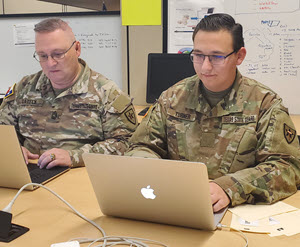By David Brown, 1LT, Texas State Guard
 AUSTIN (Camp Mabry), Texas – Although many soldiers in the Texas State Guard will tell you that serving their fellow Texans is a reward unto itself, a new program offered to all service members underscores the range of benefits available to those who wear the uniform. Starting this year, members of the Texas State Guard are eligible for free professional development and training from one of the top companies in online education.
AUSTIN (Camp Mabry), Texas – Although many soldiers in the Texas State Guard will tell you that serving their fellow Texans is a reward unto itself, a new program offered to all service members underscores the range of benefits available to those who wear the uniform. Starting this year, members of the Texas State Guard are eligible for free professional development and training from one of the top companies in online education.
This summer, every member of the Texas State Guard received (via email) a log-in and password to take advantage of the SkillSets Online Training Center, which allows participants to earn a certification in new skills (or a refresher on existing skills). Some 7,000 courses and real-world simulations are now available to service members without charge, including Six Sigma Yellow, Green, and Black Belt certification, lessons in project development and organization, team leadership, managing budgets, predictive modeling, communicating with stakeholders, and much more. Many of the offerings are centered on computer technology, ranging from user-focused training all the way up to advanced programming, network security, and the management of highly specialized systems.
"The certification and training opportunities available to members of the State Guard through SkillSets Online are a significant benefit,” says Col. Darren Fitz Gerald, Chief of Staff for the Texas State Guard. “At no cost to the individual servicemember, they can pursue self-paced professional development and, in some cases, training and coursework for nationally recognized certifications. Regardless of whether their time spent with SkillSets Online is aimed toward advancement in their civilian career or strengthening specific skills and abilities needed in the Guard, the end result is a capable and confident servicemember ready and able to serve their fellow Texan."
Pvt. Luke Turner of Flower Mound, a recent recruit, wasted no time taking advantage of the new benefit.
“I saw that my Master Sgt. had 18 classes, so I just wanted to one-up him,” Turner says.
Turner’s ambition was inspiring. In his T6 (signals) section at Texas State Guard Headquarters, a “challenge” issued by the Officer-in-Charge resulted in Turner chalking up some 96 certifications by the October drill.
You can guess who won the challenge.
“At first I started working on classes involving employee-employer relations, how to manage large groups, how to manage a conference, that sort of thing,” Turner says. “I focused on those classes because when I was younger, I volunteered at a church camp, and I’d be responsible for 12 kids–and had to learn how to handle disputes between the campers.” As Turner’s course completions mounted, he shifted his educational focus to IT (Information Technology) studies, helping him get more acquainted with some of the high-tech systems used in the T6.
Experts say online development courses provide a more flexible, convenient, and efficient way to grow and strengthen professional skills compared to in-person and other more traditional coursework options. That is an important advantage for Texas State Guard members, many of whom have busy jobs in the civilian world, to say nothing of family and community commitments. One key advantage to the SkillSets approach is that most subjects include a ‘pre-test’ option, enabling students who pass to receive credit and certification without having to sit through an entire course session (most of which are 1-2 hours long).
“I reviewed the SkillSets certifications available and did an analysis of what this would cost service members if they were to try to obtain this training in the private sector, and found we were saving soldiers tens of thousands of dollars,” says Master Sgt. James “Damon” Williams, who serves in the T6 section of Headquarters Company. “We thought not only would SkillSets be a major bonus for those already serving, but it’s also a great tool for recruitment as an extremely valuable new benefit of membership in the Texas State Guard.”
“The training is great for anyone with a job in the civilian world, someone possibly looking for a new job, or boosting your resume with credentials,” Turner says, adding, “I think you’d really be missing out if you didn’t take the opportunity to get those certifications–it’s truly a wonderful thing.”
But the Texas State Guard – and the people it serves – gain from this new benefit as well.
To be “Equal to the Task” (per the motto of the Texas State Guard) and mission-ready when asked to assist during emergencies statewide, continual training and learning are a must. On top of professional and personal development, Texas State Guard service members are constantly engaged in military training and Federal Emergency Management Agency (FEMA) studies.
The Texas State Guard is one of three branches of the Texas Military Department, along with the Texas Army National Guard and the Texas Air National Guard. Other benefits of service in the Texas State Guard include state tuition assistance, a daily stipend for state active duty, and much more. A full list of benefits can be found online at tmd.texas.gov under the State Guard tab.